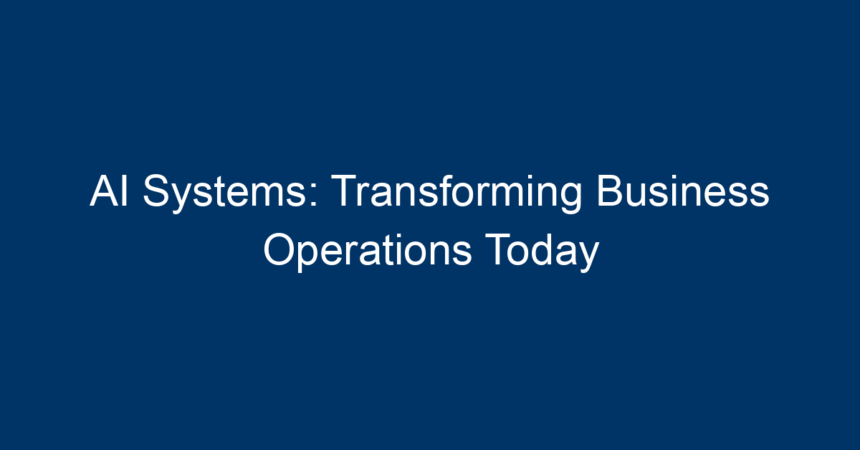In today’s rapidly evolving technological landscape, the integration of AI systems into business operations has become a game changer. From enhancing decision-making processes to automating routine tasks, AI is not just a buzzword; it represents a transformative force reshaping industries worldwide. As companies strive to enhance efficiency and maintain a competitive edge, understanding how AI systems can revolutionize operations is essential.
Understanding AI Systems
What Are AI Systems?
AI systems utilize algorithms, machine learning, and data analytics to simulate human intelligence. They can process vast amounts of data, identify patterns, and make informed predictions. This capability enables businesses to enhance their operations significantly, paving the way for smarter, more efficient workflows.
Types of AI Systems
- Machine Learning (ML): Systems that learn from data to improve over time.
- Natural Language Processing (NLP): AI that understands and generates human language, used in chatbots and virtual assistants.
- Computer Vision: Enables AI to interpret and make decisions based on visual data, useful for quality control and inventory management.
- Robotic Process Automation (RPA): Automates repetitive tasks, allowing employees to focus on more strategic activities.
The Impact of AI Systems on Business Operations
1. Enhanced Decision-Making
One of the most significant advantages of using AI systems is their ability to analyze data at an unprecedented scale. Businesses can harness AI-driven analytics to gather insights from customer behavior, market trends, and operational inefficiencies.
Real-World Application:
Retail: Companies like Amazon use AI to analyze customer purchase history, providing personalized recommendations that significantly enhance user experience and boost sales.
2. Increased Efficiency Through Automation
AI systems are designed to perform repetitive tasks with speed and precision, which means businesses can reduce human error and save time.
Real-World Application:
Manufacturing: AI-powered robots can execute tasks such as assembly and quality control much quicker than humans while maintaining high standards.
3. Customer Service Transformation
AI systems have propelled the development of sophisticated chatbots and virtual assistants that are available 24/7. These tools can manage customer inquiries, resolve problems, and provide personalized support, thereby enhancing overall customer satisfaction.
Real-World Application:
Telecommunications: Companies like AT&T utilize AI to route customer service requests efficiently, reducing wait times and improving service quality.
4. Predictive Analysis for Strategic Planning
AI systems enable businesses to anticipate market trends and consumer behavior through predictive analytics. This foresight allows leaders to make strategic decisions backed by solid data.
Real-World Application:
Financial Services: Banks and financial institutions use AI systems to analyze spending patterns, detecting fraud attempts in real-time and ensuring customer safety.
Overcoming Challenges in AI Implementation
While the benefits are clear, companies must navigate several challenges when integrating AI systems into operations.
1. Data Privacy Concerns
As AI relies heavily on data, businesses face the challenge of safeguarding sensitive information while still leveraging it for growth.
2. Skill Gaps in Workforce
The introduction of AI systems may create a skills gap among employees who need to adapt to new technology. Investing in training programs is critical for smooth transitions.
3. Integration with Existing Systems
AI systems must be integrated seamlessly with existing technologies, which can be a complex task requiring careful planning and execution.
Actionable Insights for Successful AI Integration
-
Start Small: Begin with pilot projects focusing on specific areas of need. Measure the outcomes and scale gradually as you learn.
-
Invest in Training: Equip your workforce with the skills necessary to work alongside AI systems. Continuous education prepares employees for future challenges.
-
Focus on Data Quality: Ensure that the data fed into AI systems is accurate and relevant. This foundational step is crucial for generating reliable insights.
-
Collaborate with Experts: Work with AI specialists or consult with companies experienced in AI adoption to avoid common pitfalls and maximize the potential of AI systems.
- Monitor and Iterate: AI implementation is not a one-time effort. Continual monitoring and adjustment based on feedback can facilitate ongoing improvement.
Future Trends in AI Systems
1. AI Ethics and Accountability
As AI systems become more integrated into business operations, the necessity for ethical frameworks is increasingly recognized. Companies must establish guidelines to ensure AI is used responsibly.
2. Greater Personalization
AI systems will continue to enhance personalized customer experiences by leveraging advanced data analytics, leading to a more customized approach in marketing strategies.
3. Integration with the Internet of Things (IoT)
The synergy between AI and IoT will lead to smarter ecosystems where devices communicate and provide data-driven insights, streamlining operations further.
Conclusion
AI systems are not just transforming business operations; they are revolutionizing the way companies operate and interact with customers. By enhancing decision-making, increasing efficiency, and improving customer service, AI has become an essential tool for modern businesses. However, successful implementation requires careful planning, investment in workforce skills, and a commitment to ethical practices. Embracing these technologies is no longer optional; it is vital for survival in today’s competitive landscape. Companies that adapt and innovate will be the ones that lead the charge into a future driven by intelligent systems.




